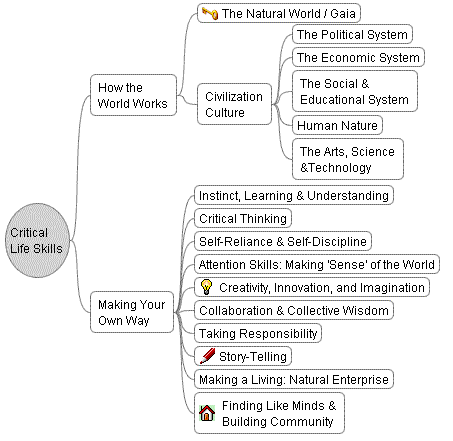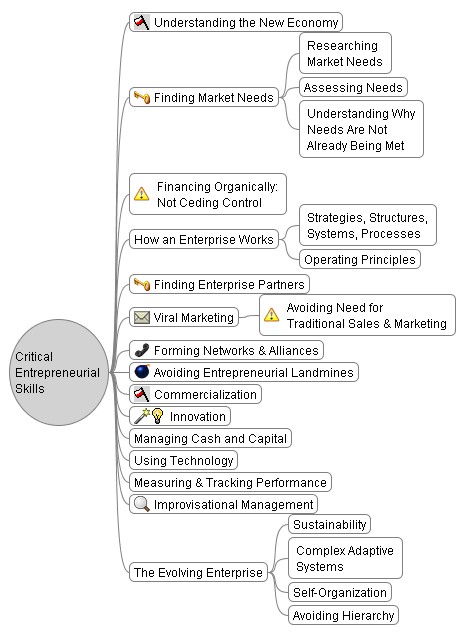
I‘ve been using the word resilience to describe the capacity — of individuals, communities and organizations — to improvise, to respond well in the moment. But I think resilience is the wrong word — it is from the Latin meaning “springing back”. Humans try to be resilient, acting as if everything is temporary, or cyclical, and as if it will always eventually possible to go back to the way things were before a challenge arose. That’s why so many of us live in misery, in false hope. While we aspire to move back to the way things once were — after the desertification, after the forests and fish have gone — the rest of all-life-on-Earth is moving on, forward. What we try to do instead of adapting to the changes in our environment, is to try to change the environment to suit us. We’ve become very good at this, but it’s unsustainable. What we’ve created in human-made environments is fragile, shabby, and ineffective. Much of human employment today is fixing all the human-made things that constantly break, and break down. Much future employment will be cleaning up the mess we’ve created with the human-made, non-biodegradable broken stuff we’ve thrown away. We try to be resilient, and to force changes in our environment, because, after learning that our cultural “software” can adapt very quickly (in as little as a generation), we discovered too late that our biological “hardware” adapts over millions of years, not decades. Today we’re racked with epidemic rates of diseases of maladaptation — notably immune system diseases, cancers, and mental illnesses. Our bodies just can’t adapt to stress, the malnutrition of the modern processed monoculture food system, and the toxins in our air, water, soils and foods. They’re still designed for life in the uncrowded, abundant and unpolluted rainforest. Alas, there’s nothing we can do about our bodies, nor is there anything sustainable we can do to our environment. Resilience is, in fact, futile — we cannot expect things to change back to what they were so that we can bounce back to what we were. And in Darwin’s sense we cannot evolve either — at best we can unschool our descendants to acquire the capacities that we lost, or never had — like the ones depicted in the charts above. We’re probably too late, those of us over 30, to learn them all effectively ourselves now. What we can do, however, is adapt and improvise. Evolution and adaptation are not about springing back, but rather springing forward. Evolution is from the Latin meaning “rolling out”, but it is worth noting that Darwin avoided the term he is now so associated with, and instead in his books used the term “descent with modification” (descent in the sense of ‘descendants’ — change only occurred with the passing of genes ‘down’ from one generation to the next). Adaptation comes from the Latin meaning “fitting in” (hence to Darwin “survival of the fittest” was not about strength or intelligence but about adaptability). Improvisation comes from the Latin meaning “[responding to the] unexpected”. These are the only effective responses to change in complex systems. Wild creatures have this ability to adapt and improvise: to fight, to flee, to change what they eat, where they live, what they do. They migrate, they hibernate, they adapt to different foods, neighbours and environments, as well as changes to members of their own community. Evolution helps them do this, by selectively favouring that capacity — those that can’t adapt and improvise, perish. So how do we, poor maladaptive and conservative creatures that we are, learn to adapt (“fit in”) and improvise (“respond to the unexpected”), and can we help our communities and organizations do so as well? Last week I visited with one of the most adaptive and improvisational organizations I know, one that I profile in my book, called Mountain Equipment Co-op. It’s a true one-person-one-vote cooperative, that began with 6 members and which now has millions. Only a tiny proportion actually participate in MEC’s decisions, but it’s enough to know that if they started doing things the members didn’t like, that could change very quickly. They generate only enough ‘profit’ to cushion them through economic downturns — any other surplus is returned as a cash refund to members based on their annual purchases. The people I’ve met like working there, and they really do care about being of service, offering excellent products (made in Canada whenever possible), and doing excellent work. As I spoke with and visited them it occurred to me that, compared to other, profit-for-shareholders companies that sell sporting goods, MEC is culturally more adaptive and resilient in 18 ways:
Here are 10 other things that organizations can do to be adaptive and improvisational, that I’ve seen some Natural Enterprises (especially cooperatives) do (I don’t know whether MEC does any of these, but it would be interesting to find out):
So much for organizations wanting to be adaptable and improvisational. What about communities and individuals? Communities (small towns, villages, intentional communities and neighbourhoods within cities) are a form of co-operative organization, the only difference being that they have a wider and more essential set of products and services, and have members instead of customers. But many the same principles of adaptation and improvision apply: autonomy, steady-state, diversity, built-in redundancy, non-indebtedness, collaboration, non-hierarchical connection, risk awareness, self-management “on principle”, emotional intelligence, biomimicry, contingency planning (including scenarios and simulations), candour and responsiveness. The town I live in tries hard, but they’re zero for fourteen on these measures. Individuals are of course part of communities and organizations, but there are also some things we can each do as individuals to be more adaptive and improvisational in our lives: be autonomous (not dependent on those outside your community), live within your means (a life of sufficiency and comfort, not one dependent on tomorrow’s income being more than today’s), get debt-free, self-manage, build emotional intelligence and other personal capacity, collaborate, plan for contingencies, always be honest, stay healthy, be good to yourself, and be open, attentive and responsive. Whew. That’s enough lists for a lifetime. Category: Complexity and Discovery
|






the title got me as my work on Transition is about reaching a more resilient way of organizing our communities:) and hearing it is futile my world crumbles.If resilience is springing back to the state before a crisis occurred then I’d like to live in a community which can weather an occasional crisis like a Super Volcano eruption and continue to develop. The problem might be one this community generates its own crisis because of exactly the way it is functioning and continues to do it again and again until it collapses and only dust settles. No adaptation and improvisation here.I like what you wrote about the resilient culture and adaptivity of the Coop showing the importance of feedback and learning. Feedback to avoid generating disruptive crisis, feedback to adapt to one which is unraveling, feedback and openness to change to pick oneself up.Thanks for the material to think about and keep them coming.
Hi Dave, Great article. If you’re (still) in the YVR area please shoot me a note.
Eventually someone found clear words to underline the difficulty of resilience, a concept of stagnation projected onto dynamic and necessarily adaptive systems. It’s a wonderful concept, though often interpreted in dangerous ways. You pointed that out very well. Thank you!
What an interesting article.